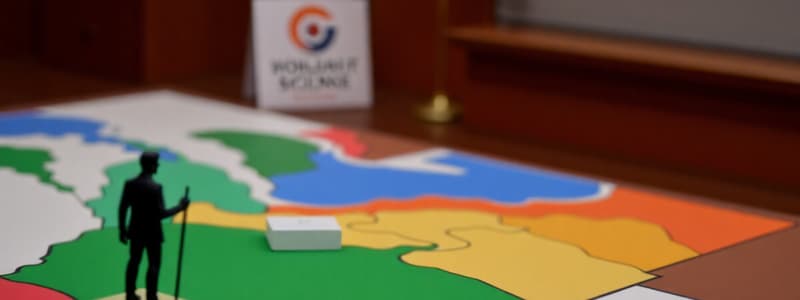Podcast
Questions and Answers
Which of the following is NOT a subfield of political science?
Which of the following is NOT a subfield of political science?
- Public policy
- International relations
- Political theory
- Comparative economics (correct)
Legitimacy refers to the acceptance of authority by the governed.
Legitimacy refers to the acceptance of authority by the governed.
True (A)
What is the main focus of liberalism as a political ideology?
What is the main focus of liberalism as a political ideology?
Individual freedoms and democracy
An _____ is a political system where power is concentrated in a single authority.
An _____ is a political system where power is concentrated in a single authority.
Match the following political ideologies with their primary focus:
Match the following political ideologies with their primary focus:
Which theory emphasizes cooperation and the role of international organizations?
Which theory emphasizes cooperation and the role of international organizations?
Political parties are organizations that aim to gain control of the government through elections.
Political parties are organizations that aim to gain control of the government through elections.
What research methods do qualitative approaches typically include?
What research methods do qualitative approaches typically include?
Flashcards are hidden until you start studying
Study Notes
Overview of Political Science
- Definition: Political science is the study of politics, government systems, and political behavior.
- Subfields:
- Comparative politics
- International relations
- Political theory
- Public administration
- Public policy
Key Concepts
- Power: The ability to influence or control the behavior of people and institutions.
- Authority: The recognized right to make decisions and enforce rules.
- Legitimacy: Acceptance of authority by the governed.
- Sovereignty: The full right and power of a governing body to govern itself without interference.
Political Systems
- Democracies: Systems where the government is elected by the populace (e.g., direct and representative).
- Autocracies: Systems where power is concentrated in a single authority (e.g., dictatorships).
- Oligarchies: Rule by a small group of people, often for corrupt purposes.
- Totalitarianism: A political system where the state recognizes no limits to its authority and seeks to regulate every aspect of public and private life.
Ideologies
- Liberalism: Emphasizes individual freedoms, democracy, and market economy.
- Conservatism: Focuses on tradition, social stability, and maintaining the status quo.
- Socialism: Advocates for social ownership and democratic control of the means of production.
- Fascism: Authoritarian nationalism characterized by dictatorial power and strong regimentation of society.
Political Behavior
- Political Culture: The set of attitudes and practices that shape and influence political behavior.
- Public Opinion: The collective preferences and attitudes of citizens concerning political issues.
- Political Participation: Involvement in political activities, such as voting, campaigning, and advocacy.
Key Theories
- Realism: Focuses on the competitive and conflictual side of international relations.
- Liberalism: Emphasizes cooperation and the role of international organizations.
- Constructivism: Centers on the impact of ideas, beliefs, and identities on international relations.
Institutions
- Governments: Structures that create and enforce laws.
- Political Parties: Organizations that seek to gain control of government through elections.
- Interest Groups: Entities that advocate for specific issues and influence policy.
- Legal Systems: Frameworks that govern the administration of justice and the rule of law.
Research Methods
- Qualitative Methods: Interviews, case studies, and ethnography to gather in-depth insights.
- Quantitative Methods: Statistics and numerical data to analyze political phenomena.
- Comparative Analysis: Examining different political systems to identify patterns and differences.
Current Trends
- Globalization: Increasing interconnectedness of politics and economics across the globe.
- Environmental Politics: Focus on policies addressing climate change and sustainability.
- Populism: Political approach that seeks to represent the interests of ordinary people against the elite.
- Technology in Politics: The role of social media, data analytics, and digital campaigning in modern politics.
Overview of Political Science
- Political science examines politics, government systems, and political behavior.
- Major subfields include comparative politics, international relations, political theory, public administration, and public policy.
Key Concepts
- Power: Capacity to influence or control behavior of individuals and institutions.
- Authority: Legitimized right to make decisions and enforce rules by an individual or group.
- Legitimacy: The general acceptance of authority by the governed population.
- Sovereignty: Complete right and power of a governing body to self-govern without external interference.
Political Systems
- Democracies: Governments elected by the people; includes direct and representative models.
- Autocracies: Concentration of power in a single authority, exemplified by dictatorships.
- Oligarchies: Control by a small group, often for corrupt or self-serving purposes.
- Totalitarianism: State with no limits on authority, controlling both public and private life.
Ideologies
- Liberalism: Advocates for individual freedoms, democratic governance, and a market economy.
- Conservatism: Values tradition, social stability, and prioritization of the status quo.
- Socialism: Promotes social ownership and democratic control over production means.
- Fascism: Nationalistic and authoritarian, marked by dictatorial power and societal regimentation.
Political Behavior
- Political Culture: Attitudes and practices influencing individual and collective behavior in politics.
- Public Opinion: Collective preferences and positions of citizens on political matters.
- Political Participation: Active involvement in political processes, including voting and campaigning.
Key Theories
- Realism: Highlights competitive and conflict-oriented aspects of international relations.
- Liberalism: Stresses cooperation among states and the importance of international organizations.
- Constructivism: Focuses on how ideas, beliefs, and identities shape international relations and political outcomes.
Institutions
- Governments: Entities responsible for creating and enforcing laws and regulations.
- Political Parties: Organized groups aiming to gain control over government through elections.
- Interest Groups: Organizations that advocate for specific issues and seek to influence political decisions.
- Legal Systems: Frameworks regulating the administration of justice and upholding the rule of law.
Research Methods
- Qualitative Methods: Techniques like interviews and case studies that provide detailed insights into political phenomena.
- Quantitative Methods: Use of statistical analysis and numerical data to study political trends and behaviors.
- Comparative Analysis: Methodology for examining and contrasting different political systems to uncover patterns.
Current Trends
- Globalization: Heightened political and economic interconnectivity across countries.
- Environmental Politics: Focus on legislation and policies aimed at combatting climate change and promoting sustainability.
- Populism: Movement representing ordinary people's interests, often in opposition to elite control.
- Technology in Politics: Influence of social media, data analytics, and digital campaigning on modern political landscapes.
Studying That Suits You
Use AI to generate personalized quizzes and flashcards to suit your learning preferences.




